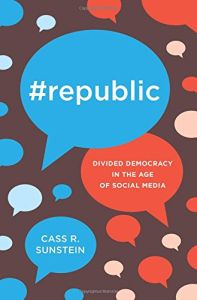Lack of exposure to different viewpoints threatens informed choices and free societies, warns Cass R. Sunstein, legal scholar and former White House executive. He argues that although the internet enables people to share ideas, algorithms that curate what viewers see lead people into “prisons of their own design,” and foment polarization that threatens society’s capacity to self-govern. Sunstein focuses on why keeping people poorly informed poses a risk to democracy. His careful research and thoughtful presentation provide a much-needed contribution to scholarship on the web’s social impact.
People naturally prefer opinions and positions that match their own predispositions.
Online and offline, most people gravitate to public voices with whom they share thoughts and opinions. Facebook and Google know this and created algorithms to filter news feeds that match people’s browsing histories and offer an individualized news feed that might as well be called The Daily Me. This curated universe offers benefits, but people no longer see alternative points of view. This creates an echo-chamber effect, amplifying and reinforcing existing biases. A well-functioning free society needs a diversity of experiences to counteract polarization and “partyism” – that is, a visceral dislike of members of another political party.
Healthy online interactions should include the unexpected encounters you’d find on a busy street. In the past, general-interest media, such as Time, Newsweek or CBS-TV provided diversity and breadth of perspective, fostered mutual experiences, and facilitated common ground. Today’s abundance of choices provide a boon to society, but the waning of shared experiences poses a ...
Legal scholar Cass R. Sunstein, JD, served as administrator of the White House Office of Information and Regulatory Affairs during the Obama administration. His other books include Can It Happen Here, The Cost-Benefit Revolution, Going to Extremes, On Freedom, How Change Happens and The World According to Star Wars.










Comment on this summary